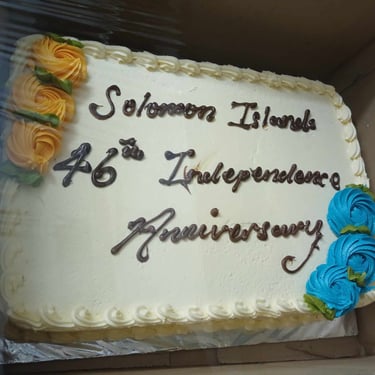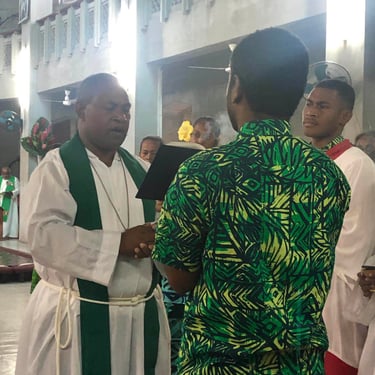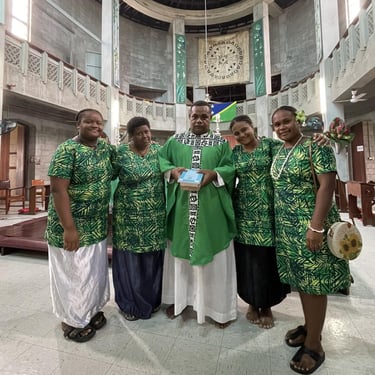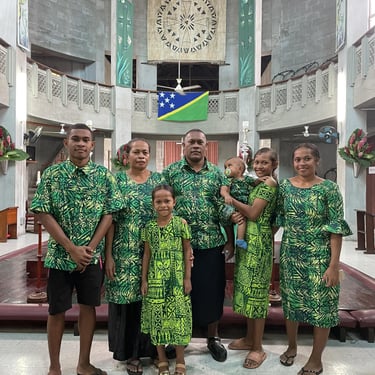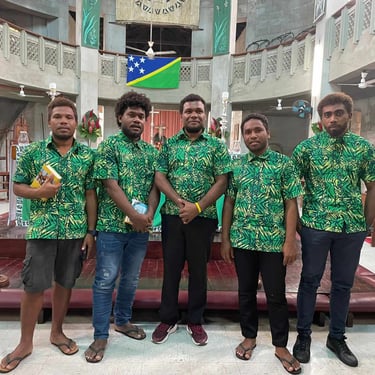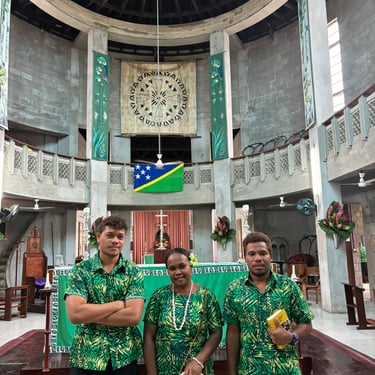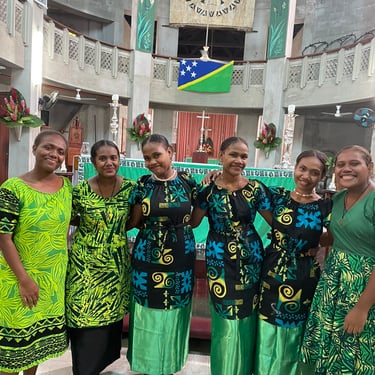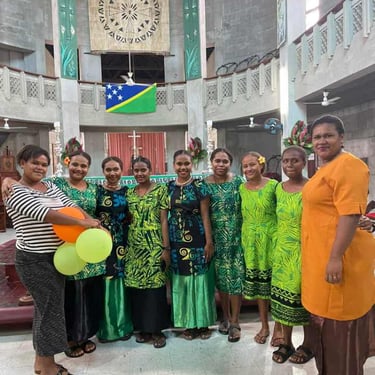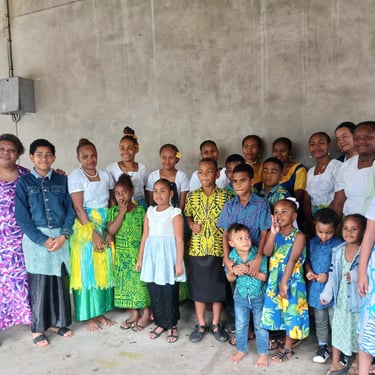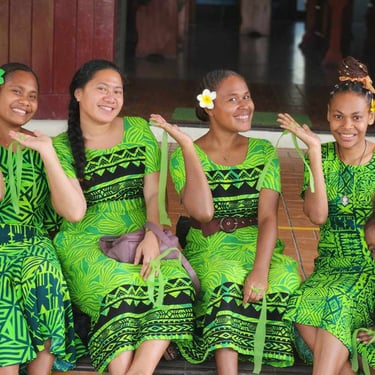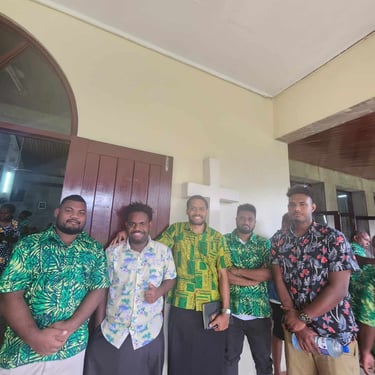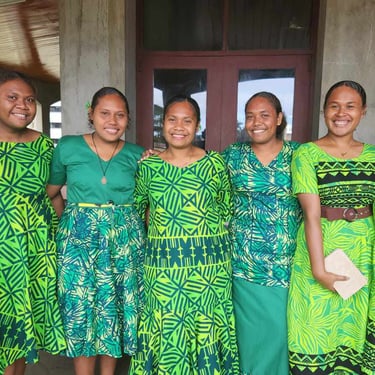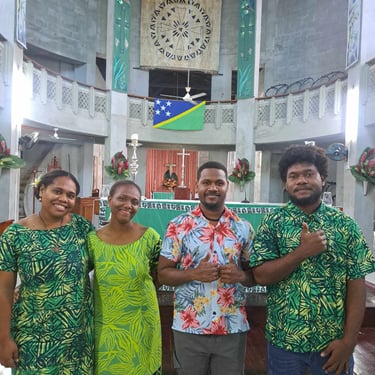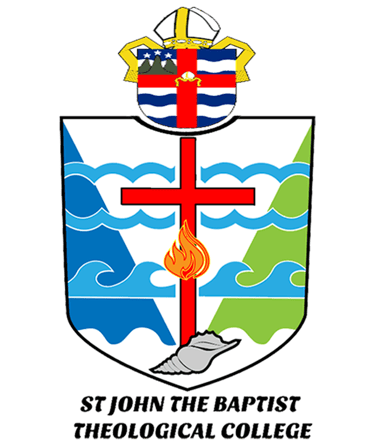Celebrating Solomon Islands Independence Day
Sermon by Rev. George Pukukesa. Holy Trinity Cathedral, Suva
Sermon: Sunday 7th July 2024 – Independence Day of Solomon Islands
Text: Matthew 5: 1-12
Today marks a significant moment in the history of Solomon – the birth of a nation founded on principles of liberty and justice. Today is not just only a celebration of political freedom, but an opportunity to reflect on our spiritual freedom. We claim to be an independent nation but are we free indeed? As a nation, we create laws, yet the more laws we make, the more imprisoned we become. Often people move away from God's original intentions and purpose. We separate ourselves from God. In other words, we tell God, leave us alone! We can take care of ourselves. Such is declaring ourselves independent from God and that is called (Self-government). Self-government is not living under the rulership of God and that is what is known as Sin. The more independent and self-sufficient we are, the more we become in danger of separating ourselves from God.
The problem that affects our world today was very much attached to the fall in the Garden of Eden. Humanity inherited the sin of desiring to be like God. In our quest to understand life, people search for knowledge. Knowledge can bring us to a place where we can actually become teachers, but teachers who are in ourselves become unteachable. We can actually come to a place of study yet unable to represent God. The more knowledge we acquire, the more we become independent and in danger of pushing God aside from everything we do. People seek fame, status, and glory. Countries compete for wealth and economic power while others are exploited. Given the above, this is the kind of world that Jesus, the Son of God came into the world to deal with.
Our gospel for this morning is on the Beatitudes of the Sermon on the Mount (Matt 5: 1-12). To fully understand the Sermon on the Mount, we need to remember the context of the gospel of Mathew. The gospel of Mathew is about the arrival of the Messianic Kingdom. It opens up with John the Baptist preaching in the desert of Judea saying; “turn away from your sins because the Kingdom of Heaven is near (Matt 3: 2).
The full manifestation of the Kingdom of Heaven has been fulfilled through the presence of Jesus, and it stands central to all of Jesus’ teachings. Jesus is the king of that Kingdom and he came into the world for no other than the purpose of establishing and founding the Kingdom of that place called Heaven here on earth. Jesus did not establish the church, but he established the Kingdom of Heaven, which the Church is responsible for its extension and expansion throughout the entire world. And this has been affirmed in the Lord's Prayer we pray daily saying, “May your Kingdom come on earth as it is in Heaven”.
How can the earth be made to become like that of the Kingdom of Heaven? It is the task of the Church. Who is the Church? The Church is all Baptized Christians. We are responsible for the task of making the earth become like that of the Kingdom of Heaven. To make Earth become a colony of Heaven.
This morning, we hear Jesus the king of the Kingdom calling citizens of his Kingdom to live a life that reflects the culture of the Kingdom of Heaven. This Kingdom has its own way of life. That life is our true identity as Christians and it distinguishes us from the world because we are not of the world. Living that lifestyle is how we make the earth become like the Kingdom of Heaven. So the more people live according to the cultures of the Kingdom of Heaven, the more the Kingdom of Heaven is gaining territory on earth. It is not all about mere words but a lifestyle that transforms the world to become the true likeness of the Kingdom of Heaven.
Jesus’ Sermon on the Mount in Matthew chapters 5 to 7 is all about Jesus laying out a kind of manifesto on how the kingdom of heaven will operate on earth, how its citizens will behave, what they are supposed to be like, and so forth. Likewise, the portion of the Gospel on the Beatitude (Matt 5: 1-12).
The word “blessed” in the Beatitude was originally used in the Hellenistic period. At that time it carried the idea of being favored by the gods of the Greeks but it was applied by the Jewish text of being favored by God. The word blessed means supremely blessed or by extension fortunate, well off, happy, or content. It’s all about one who finds favor with God which brings about its own contentment and happiness.
"Blessed Are the Poor in Spirit, for theirs is the Kingdom of Heaven" (Matthew 5:3)
Poor in Spirit is not about a person being poor but is about people who understand their spiritual conditions without God. A person who has the mindset and the attitude to come even to God and that they recognize that without God they are spiritually bankrupt. They depend completely on God for any spiritual blessing or any spiritual gain that they might have. A person who lives completely submissive to God. Such are the inheritance of Heaven. Without ourselves being able to recognize our own spiritual weaknesses we will never be able to enter into the Kingdom of God.
"Blessed Are Those Who Mourn, for They Will be comforted" (Matthew 5:4)
Mourn is about those who are mourning about their spiritual conditions. It’s the type of grief that one expresses because they understand that their spiritual conditions hurt God. Such people will be comforted.
“Blessed Are the Meek, for They Will Inherit the Earth” (Matthew 5:5)
Meek is about those who know who they are to the fullest amount of their ability and control themselves to follow the will of God. To be “‘God-fearing, righteous, humble, teachable, and patient under suffering’. Such people will surely inherit the earth.
"Blessed Are Those Who Hunger and Thirst for Righteousness, they will be Satisfied” (Matthew 5:6)
Hunger and thirst for righteousness is the hunger and thirst for God's word, for the bread of life. To have a great desire to know and do the will of God. Such people will be filled/satisfied (cf. Matt 6:33).
“Blessed Are the Merciful, for They Will Receive Mercy” (Matthew 5:7)
The merciful is the person who is aware of his or her own desperate need for mercy, not simply from man but simply from God. This Mercy doesn’t come from the merit of the one whom we’ll be merciful to. Not the one deserving that mercy. It doesn’t look for who wants it or who doesn’t. Otherwise, it wouldn’t be mercy. It's like God's grace. It falls on everyone alike. This is the kind of mercy Jesus is referring to. Such people will receive mercy.
"Blessed Are the Pure in Heart, for They Will See God" (Matthew 5:8)
People who are sincere in heart. They do not try to pretend or hide when it comes to God. Having a single-minded devotion towards God. To be counted among those who “love the Lord, who seek to follow Him and keep His commandments, who are striving to live virtuous lives and endure faithfully to the end. The pure in heart are those who control their thoughts to keep themselves free. For such people shall see God.
"Blessed Are the Peacemakers, for They Will Be Called Children of God" (Matt 5:9)
Peace Makers are not mediators of human disputes, but in the ultimate sense to bring to man the peace of Christ. They bring the message or the gospel of peace to all whom they come into contact with. It’s that message of peace that surpasses all comprehension Paul referred to in Ephesians. It is the peace of God that can help a person to endure no matter what trials or circumstances they are in. They will be called the sons of God.
Blessed are those who are persecuted because of righteousness, for theirs is the kingdom of heaven. 11 “Blessed are you when people insult you, persecute you, and falsely say all kinds of evil against you because of me. 12 Rejoice and be glad, because great is your reward in heaven, for in the same way they persecuted the prophets who were before you” (Matt 5:10 - 12)
These two are the two sides of the same coin. Blessed are those who suffer for the Kingdom of God. They shall find favor in God because they suffer as Christians for God's sake. Such people have a great reward in Heaven.
What does the beatitude mean to us today as we celebrate the 46th year of political independence of the Solomon Islands? The Beatitudes presents a composite poetic of what a citizen of the kingdom should look like, their attitude, and their character. And because we are the disciples today, these beatitudes should be our character as Christians. They should be reflected in our lives daily as we live.
We as Solomon Islanders claimed ourselves to be Christians. Are we sure that we are living according to the principles of the Kingdom taught by Christ to us this morning? God allows us to become independent as a nation politically, but not to declare ourselves independent from Him. God wants us to be submissive and live according to the cultures of the Kingdom of Heaven. As Christians, we understand that true freedom is deeply rooted in our faith in Christ. For, it is only in this way that we can truly become sons and daughters of God, and be sure that one day we will all surely see God. God Bless the Solomon Islands and the Pasifika Community from shore to shore.
To God be the Glory, Great Things He has done.
